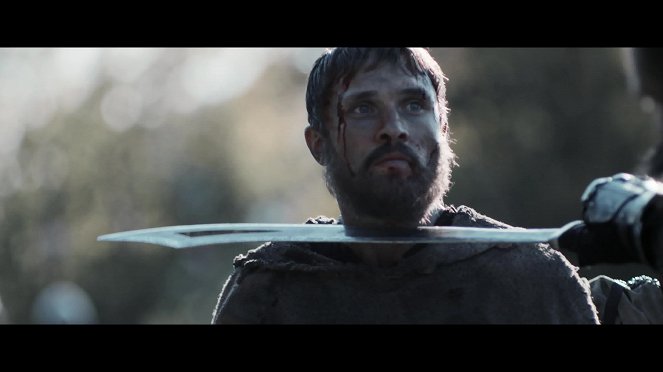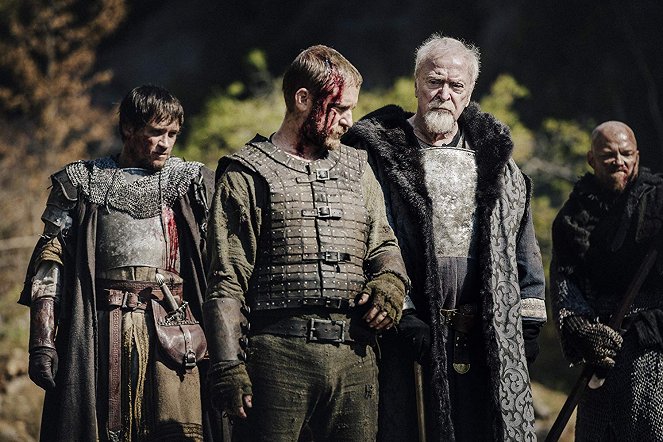Directed by:
Petr JáklCinematography:
Jesper TøffnerComposer:
Philip KleinCast:
Ben Foster, Sophie Lowe, Michael Caine, Til Schweiger, Matthew Goode, William Moseley, Roland Møller, Karel Roden, Werner Daehn, Kevin Bernhardt (more)VOD (3)
Plots(1)
Set in 14th Century Prague, the Holy Roman Empire is plummeting into chaos after the death of its reigning emperor while brothers King Wencelas of Czech and King Sigismund of Hungary battle for control of the empty throne. Handsome, righteous mercenary leader Jan Zizka is hired by Lord Boresh to kidnap the powerful Lord Rosenberg’s fiancée, Katherine, in an attempt to prevent Rosenberg’s rise to power alongside Sigismund and ultimately foil Sigismund’s plot to take the crown. As Katherine becomes caught in a dangerous political game between sides, Jan falls in love with her. Turning against his own religious and political faith, Jan fights back with a rebel army in an attempt to save Katherine and battle against the corruption, greed and betrayal rampant amongst those clawing for power. (The Avenue Entertainment)
(more)Videos (10)
Reviews (12)
Petr Jákl practically confessed his love for Braveheart in every interview. And that's exactly the kind of film he made, an origin story of Jan Zizka for foreign audiences. From the whole cultural phenomenon, he chose the myth of birth and supported it with great names. Among many foreign actors that Jákl managed to work with, I would especially highlight Til Schweiger, who is exactly the star that has enough appeal to the audience and at the same time is not at all foreign to our cultural environment. That's why his Rosenberg is a feast for the eyes and at the same time the most interesting supporting character. As a whole, the film works, and it has a lot to offer.
()
Jakl really needed the help of renowned historians for this action-packed tale of running around in the woods? Well, fuck me Žižka! It looks as dull as the American The Pagan Queen did 14 years ago. There are basically only four alternating locations: a forest, the chapel with Sigismund, a cave and the quarry of Great America, and the one (!!!) nice visual effect shot in the whole film (the arrival of Boreš in medieval Prague) doesn't save the overall cheapness of it all. I used to think that Jakl is at least a skilled producer who can generate bags of gold, but I'm starting to doubt that too. Ironically, I'll add that his highlight so far is the blood-curdling screaming in Pterodactyl, where at least he was fun. PS: Fuk can't be taken seriously anymore, he's getting more and more ridiculous.
()
Petr Jákl's Jan Žižka is (and will be) one of those films that divides audiences into several (Hussite?) camps in terms of their reception. I went to the cinema with lukewarm expectations, as there were several factors that didn't exactly play into the film's hands – in short: a cast of international stars in the most expensive Czech film about our most famous warlord, and the whole thing is helmed by a former judoka and stuntman. But I was pleasantly surprised by the result. Yes, you have to turn a blind historical eye, even if Jákl "cheated" by focusing on an unknown phase of Žižka's life, but it is still a solidly made historical co-production that can stand comparison with (purely) foreign films of the same genre. From a technical point of view, it is a decently crafted piece of filmmaking with more than one raw moment, and the film visually benefits from beautiful Czech locations and castles. In terms of screenwriting, it's broadly in keeping with the genre, so you shouldn't expect any deep dialogue or breathtaking plot twists. I was quite pleased with the cast. Ben Foster took up the mace with honour and the fictional character of Lord Boris (though the title is not accurate) played by Michael Caine also impressed me. Perhaps it was my momentary state of mind in the cinema, and quite definitely it was the fact that I come from Přibyslav, the place where Jan Žižka died, but Jakl's tribute to heroism just suited me. Three and three-quarters stars! PS: I never expected to see a lion in a Czech historical film. But on the other hand - why not?
()
After years of promises and media hype, it's here! And within five minutes of watching it, everyone would rather just forget about it. I suppose nobody had much expectations, but I was hoping for at least an enjoyable portion of filmmaking. What I got instead was a grinding grey amateurish borefest, full of the most tedious pathos and jaded actors' faces. Aside from the endless hunt for the macguffin that is the female lead, and a throwaway shot of a three-way that the ruler wants to scheme on, the script offers nothing but a hodgepodge of the most hackneyed movie clichés you can imagine. There’s no characterisation of characters, there are no interesting dialogues, there’s no clear storytelling, there’s no dramaturgy, there’s no pace. Jan Žižka represents the purest grey you could get from the most expensive Czech production.
()
Forget the clichéd portrayal of the Middle Ages and the historical inaccuracies that abound also in Braveheart, Robin Hood, Kingdom of Heaven and the like, I have another problem: what is Jan Žižka really about? What’s its idea? I got lost in the intrigue of "who, with whom and why", I was bored by the second third of the film, which dragged on enormously without much happening in it, and I wasn't very interested in Žižka's emergence, because there was hardly any of it. Žižka was almost always the same Žižka from the beginning to the end, the routine script didn't provide any big surprises. However, what Petr Jákl the (co)screenwriter failed to do, Petr Jákl the director masked quite skillfully, but also in no revelatory way (the battles, or rather skirmishes, are desperately muddled and sometimes look ridiculous, but for example the scene with the lion is really great), and above all Petr Jákl the producer, who managed to get really, really, really good actors, led by a fine Ben Foster and including Michael Caine, who I never thought I would see in a Czech film, let alone Jan Žižka. In spite of all the criticisms, I have to wish the film success, because it is a revelation in domestic filmmaking in a good sense (I don't want to write like a one-eyed man among the blind), and I would like it to show that Czechs can produce something other than romantic comedies and communist dramas. However, if anyone in our country has managed to make a great film of world quality in recent years, it was Václav Marhoul (and he actually made two).
()



Ads